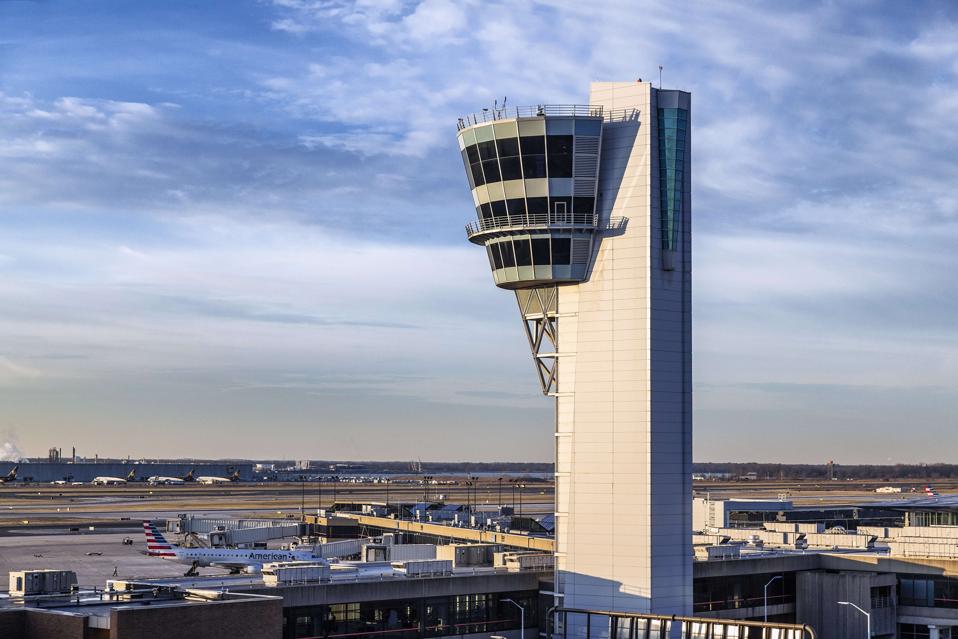Topline
Flyers should expect unpaid air traffic controllers to call in sick more often as the government shutdown continues, a veteran air traffic controller told Forbes, as the stress of working without pay in a critically understaffed agency has become “untenable.”
Key Facts
An FAA air traffic control advisory issued just after 5:30 p.m. EDT noted “staffing triggers”—indicating an inadequate personnel level threshold—at six facilities: Philadelphia International Airport; Washington D.C.’s Reagan National Airport; the Albuquerque Air Route Traffic Control Center (ARTCC), which manages traffic over Arizona, New Mexico and parts of Texas and Colorado; the Central Florida Terminal Radar Approach Control (TRACON), which manages traffic for Orlando International and other airports in the Orlando area; Denver International Airport; and the Los Angeles ARTCC, which manages traffic across Southern California and surrounding areas.
Despite staffing shortfalls Wednesday, there were just over 3,200 flight delays as of 6 p.m. EDT, according to FlightAware—roughly 7% of the day’s flights—not an unusually high number.
An earlier advisory issued around 3:30 p.m. EDT also noted staffing shortages at Philadelphia and Reagan National airports and the Central Florida TRACON.
Advisories issued at 5 a.m. and 7:45 a.m. EDT Wednesday morning included a staffing trigger for Philadelphia International Airport that removed before 9:30 a.m.
Six FAA facilities—Boston, Chicago, Houston, Las Vegas, Nashville and Philadelphia—saw staffing shortages Tuesday afternoon, according to a previous advisory.
A dozen FAA facilities saw similar staffing triggers Monday evening, while the air traffic control tower at Hollywood Burbank Airport in Los Angeles was temporarily unmanned Monday evening due to staffing shortages, the Los Angeles Times reported.
Are Air Traffic Controllers Calling In Sick?
The National Air Traffic Controllers Association has warned its 19,000 members that organized “sick outs” are illegal. But union officials and individual air traffic controllers have told Forbes that missed paychecks will add to the toll of working in an already strained system. “Not paying the understaffed controllers we already have, and then getting upset they find this added stress untenable, is idiotic,” a veteran air traffic controller working at a major East Coast airport told Forbes on Tuesday. “Missing even one [paycheck] is a cause of stress—stress they don’t need and you don’t want controlling your airplanes. This will only get worse and escalate the longer this shutdown continues.”
Crucial Quote
“The air traffic system, in general, is stressed to the max,” the veteran air traffic controller told Forbes, adding “sickouts will continue to happen because the [controllers] aren’t fit for duty.”
Why Aren’t Air Traffic Controllers Getting Paid During The Shutdown?
Air traffic controllers, like Transportation Security Administration officers at airport screening checkpoints, are “excepted” from furloughs and work without pay during the shutdown. By law, they will have their back-pay restored after the shutdown ends—although President Donald Trump suggested Tuesday that might not happen. Air traffic controllers are scheduled to receive a partial paycheck on Tuesday, Oct. 14, and a zero paycheck two weeks later, Nick Daniels, president of the 19,000-member National Air Traffic Controllers Association, told Forbes.
How Did Air Traffic Controllers Cope During The Last Government Shutdown?
During the last shutdown, which stretched for 35 days from December 2018 to January 2019, the longtime shortage of air traffic controllers led to increased absenteeism, which in turn led to flight delays. For example, after a missed paycheck in January 2019, six air traffic controllers called in sick in New York, leading to more than 600 flights delayed at LaGuardia Airport that day, CBS News reported. Disruptions at multiple airports reportedly led Trump to agree to end the shutdown.

